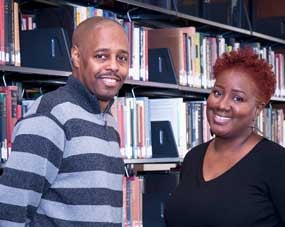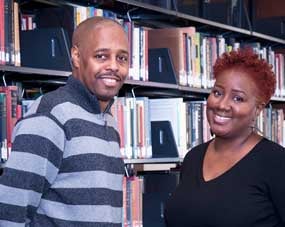 KINGSTON, R.I. – Feb. 11, 2014 – Desiree Nash was a hard working, competent, spirited sales associate for a major telephone company when a successful business executive was blunt with her one day.
KINGSTON, R.I. – Feb. 11, 2014 – Desiree Nash was a hard working, competent, spirited sales associate for a major telephone company when a successful business executive was blunt with her one day.
“He told me, ‘Desiree, you are charming, and you have all this work experience. That will get your foot in the door, but you will never get a seat at the table unless you get a degree.’ ”
Nash had attended the University of Rhode Island back in 1997, but left after one year to pursue other interests in Atlanta. Now she was paying for her decision to drop out: no diploma, no promotion.
Within days of that chat, Desiree picked up the phone and called URI’s Finish What You Started, an innovative, fast-growing program that is giving students like Nash a second chance.
Last September, Nash started where she left off 17 years ago, only this time she was wiser, more focused, and eager to succeed. Since the fall, she’s been taking classes at the Alan Shawn Feinstein campus in Providence to earn her Bachelor of Interdisciplinary Studies, with a major in business institutions. She’ll graduate in 2016.
“I have an attainable goal,” she says. “There’s no stopping me.”
The program is the idea of Dean Libutti, URI’s vice provost for enrollment management and a strong advocate for returning students. In 2011, the University reached out to a pilot group of 300 students who had left before completing their studies. Most had earned 75 credits toward the required 120 credits for a bachelor’s degree.
The response was overwhelming. As of Dec. 2013, 197 adults, ages 25 to 72, have enrolled in classes and 41 have graduated. Those are encouraging numbers in a state where an estimated 115,000 Rhode Islanders have started college, but never completed.
“Finish What You Started is amazing because it works,” says Connie Pritchard, program coordinator. “One of the reasons it’s so successful is that we establish a relationship with the students. We stay in touch and not just by email. We call, we talk.”
The staff works closely with students on re-admission and once they’re enrolled they receive full support to relieve any worries they might have about returning after a long absence. Staff helps with class registration, and mentors and tutors offer guidance.
Classes are held on the Providence campus and URI’s main campus in Kingston, as well as online. URI also offers courses, at reduced cost, during the winter J-term and summer.
Student support services are available on both campuses, and on the Providence campus tutoring and workshops are held every Saturday, complete with free babysitting for students with children. The workshops focus on both academic and life issues, from how to balance work and family to how to write a paper. For students looking to return to URI who owe prior balances, URI has even developed a “matching” scholarship up to $500 to help students re-enroll in good financial standing.
“We work hard identifying students’ needs and match them up with resources, whether it’s financial aid, academic advising or admissions help,” says Pritchard. “We help students realize their goals – and dreams.”
Personal accomplishment is not the only reason to earn a degree. Increasing the number of college graduates in the state – in essence, educating the work force – is crucial to revitalizing the state’s fledgling economy.
It’s no secret that college graduates also earn more money. According to the Georgetown University Center on Education and the Workforce, the average lifetime earnings of a college graduate is $2.3 million, compared to $1.5 million for those with some college and no degree, and $1.3 million for high school graduates.
With the number of projected high school graduates on the decline, and a national government push to increase the number of college graduates by 7 million people by 2020, the population of those who started college but never completed is an important yet often overlooked group, says Libutti.
The program has been so successful it has evolved to help even more students, Libutti says. Now the program also works with students who did not attend URI initially, but want to finish their degrees. In a few instances, URI has even worked with students’ prior institutions to help those students use URI classes to complete their degrees elsewhere.
“Finish What You Started is on to something very big and very necessary,” says Libutti. “Returning to college is not easy, but having advanced academic credentials and skill sets are essential in today’s economy. Finish What You Started is good for individuals and their families, employers, Rhode Island, and our economy.”
Libutti says employers, family members, legislators, and former teachers have all asked about the program, recognizing how important it is to educate Rhode Islanders in the 21st century. “It has truly become a statewide venture,” he says.
Nash, now 34 and living in Providence, is grateful she’s part of that statewide initiative. “You can’t be a sales associate forever,” she says. “I got burned out. I wanted more from my life.”
Pritchard and an adviser have guided Nash over the last six months, making sure her academic and personal needs are met. They plan to help her find a promising job internship in the spring.
“If I ever have a question about anything, there is someone I can ask,” she says. “Students going back to school have been away for so long, and things have changed. It’s great having so much support.”
That personal attention is one of the reasons Jeymys Rosari, 31, of Cranston, re-enrolled under the program. She first attended URI in 2006, but left after three years when “life got in the way.” Married with children, she had too much on her platter to make a serious commitment to school.
As the years passed, she realized she did not want to work in a cubicle for the rest of her life processing car loans in her entry-level, hourly job. On a whim, she searched the URI website for “academic advisers” and Finish What You Started popped up. Within hours, she was on the phone with the other program coordinator, Nancy Rabidoux, who worked swiftly to sign her up.
“I made the dean’s list last semester,” says Rosari, who also received a scholarship to help defray costs. “I had straight A’s. I’m so motivated this time. I’m so determined.”
Domingo Varella, of Cranston, was only about 30 credits short of his bachelor’s at URI when he left to find a job so he could take care of his young daughter. He found work as a technician at the lottery company GTECH and as an aide in a group home for adults with mental challenges, but he always regretted never finishing his studies.
When his daughter, Rae-Ann Roderick, graduated from URI last spring, he knew he had to go back – for Roderick and his other two children, ages 5 and 8. “I wanted to show my children that I never quit,” he says.
Later this year, he’ll graduate with a bachelor’s degree in human development and, if all goes as planned, start a career as a counselor, possibly working with teenagers. With a fresh degree from URI, he’ll start a new life, at the tender age of 44.
For more information about Finish What You Started, call program coordinators Connie Pritchard at 401-277-0404 or Nancy Rabidoux at 401-874-2413. The program’s website is Finish What You Started.
Photo above: Desiree Nash and Domingo Varella, both students at the University of Rhode Island who re-enrolled under the Finish What You Started program. Photo by Michael Salerno.

